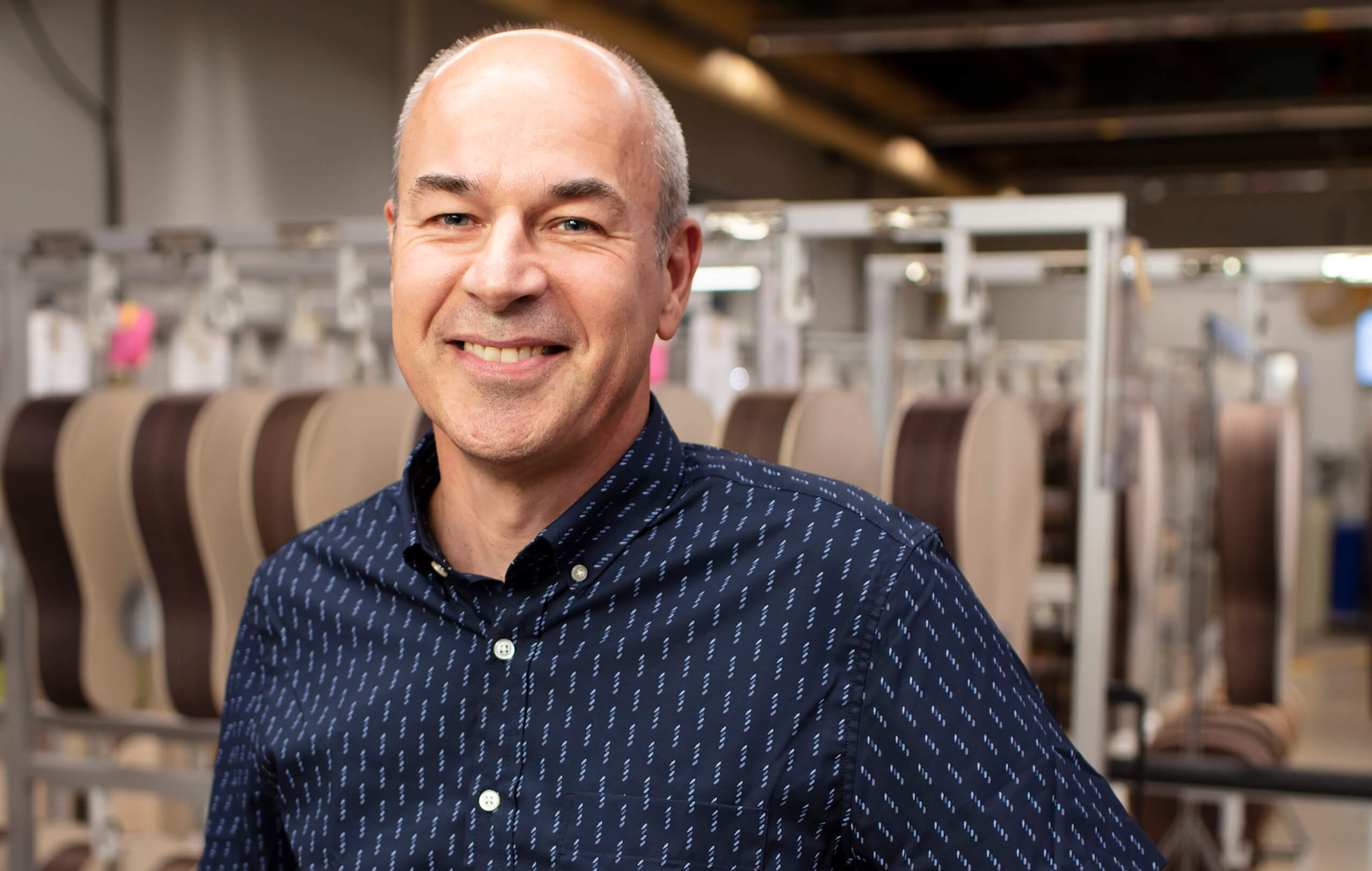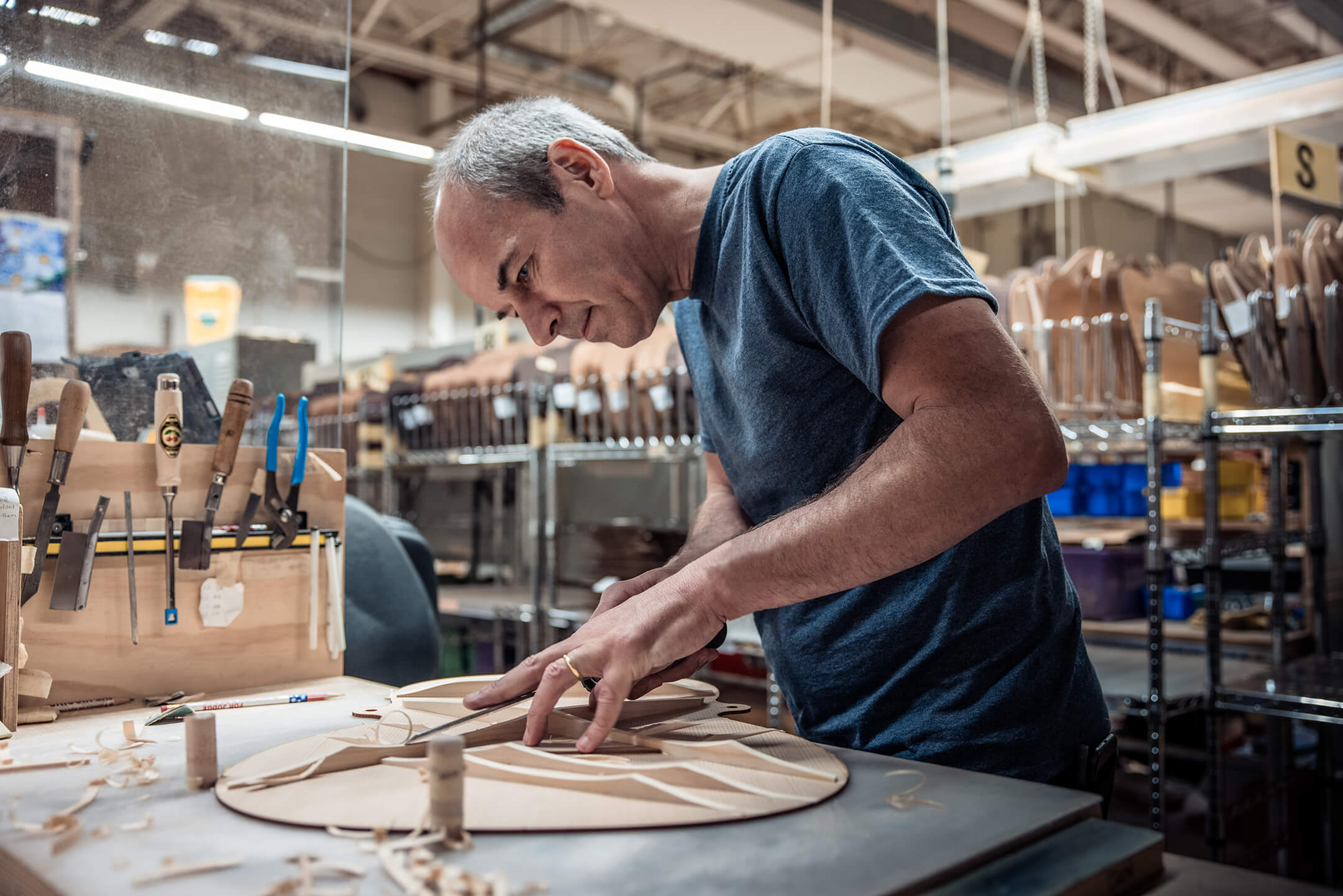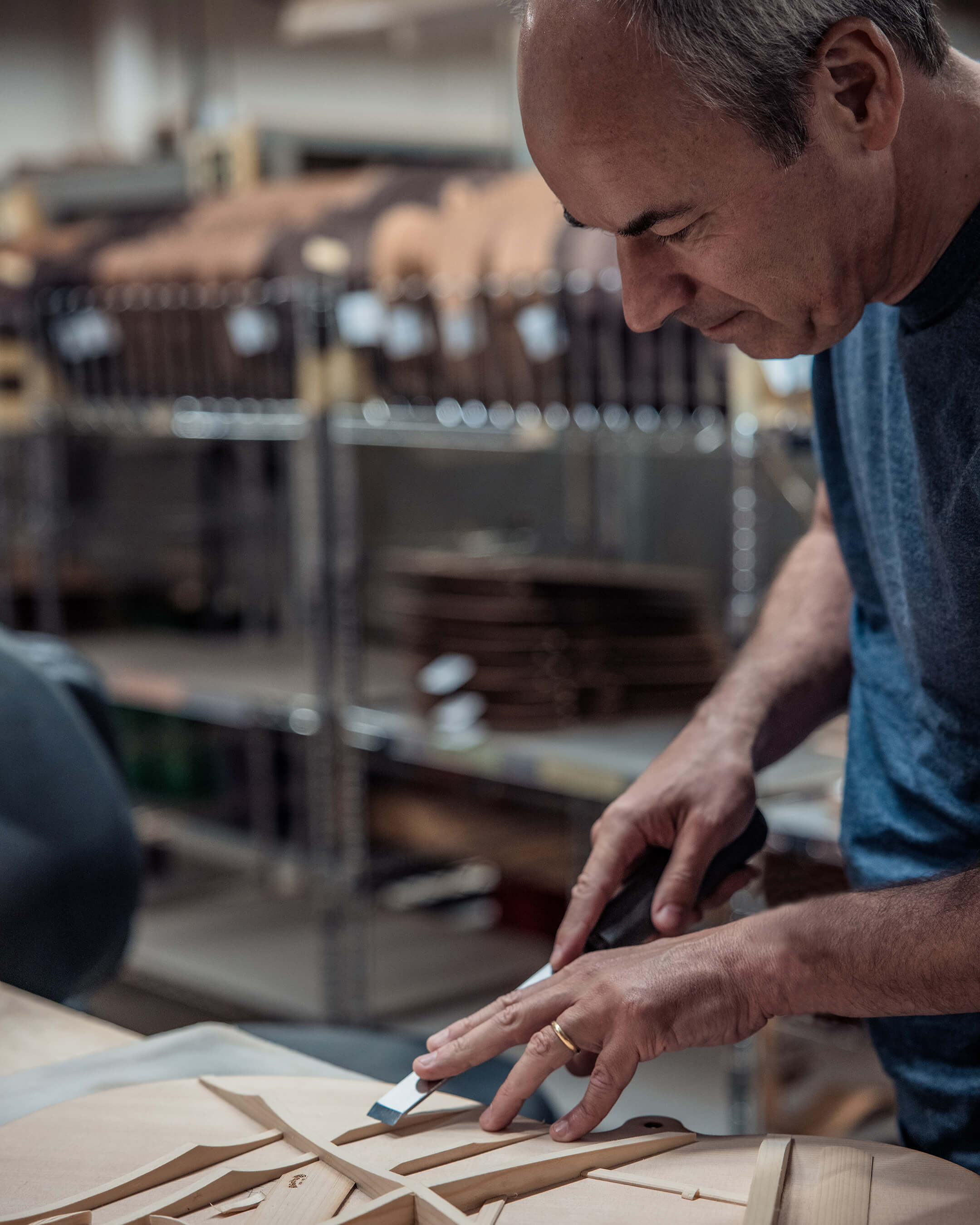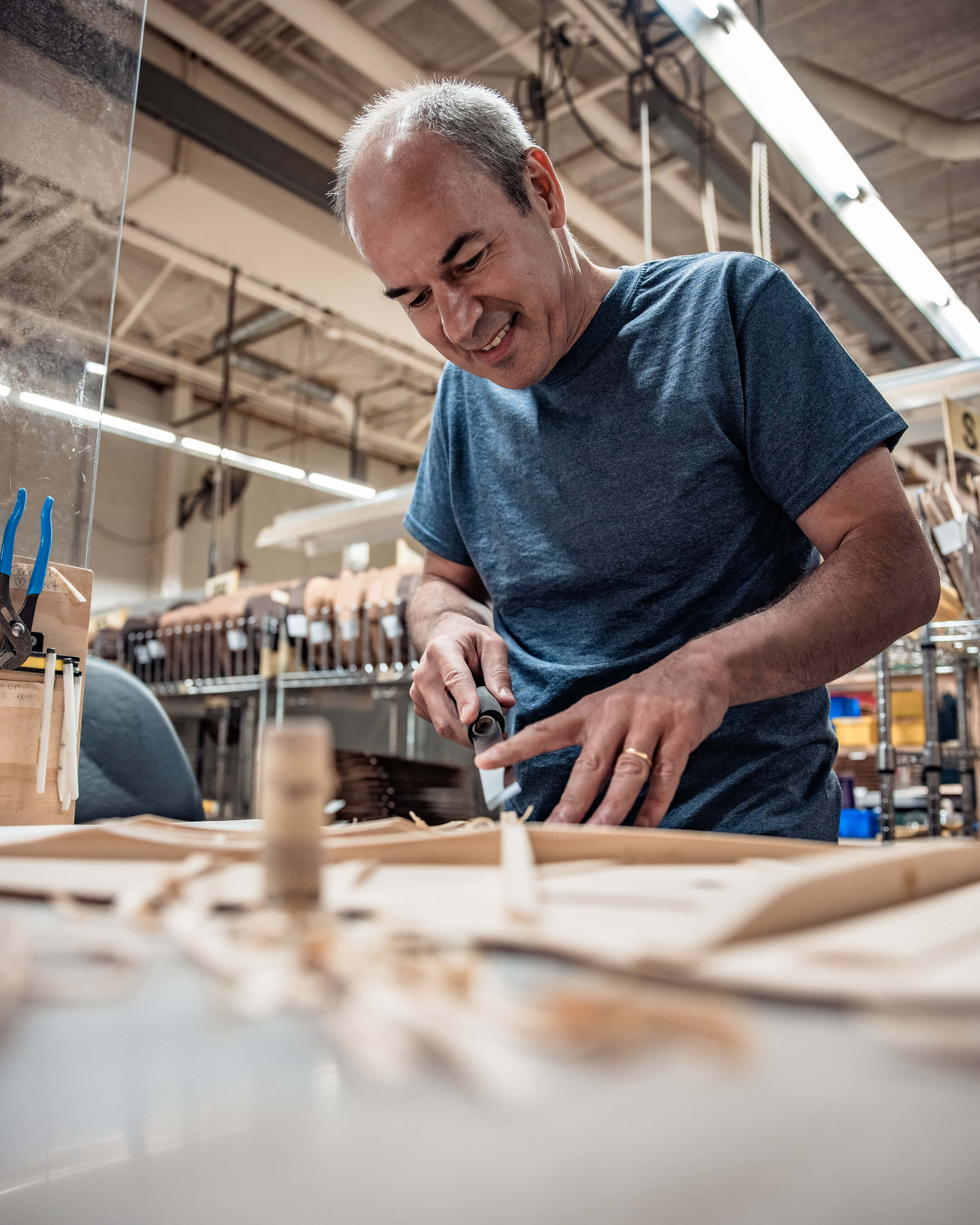Related Tags
“Our people are at the heart of the instruments we build, that’s our secret sauce” Martin CEO Thomas Ripsam on stewarding the brand for a new generation of musicians
A year after taking over the reins of the world’s most iconic acoustic guitar company, we sat down with with the German CEO to talk the importance of stories, why Martin’s people are what set it apart from the crowd, and his broad musical tastes.

All images: Martin Guitars
Did you know that the man in charge of Martin Guitars is a metalhead? “I love metal,” he tells us. “I mean I also love the Carter Family and Radiohead, but I love metal – Opeth, Slayer… obviously I love Metallica.”
That man is Thomas Ripsam and it’s not the first time he’s surprised people. The German certainly raised a few eyebrows when he was chosen to succeed longtime Martin Guitars head honcho Chris Martin IV, who stepped down (while remaining chairman of the board) in 2020 after nearly four decades in charge of the company – not least because his surname wasn’t the same as the one above the door.
With his background consulting with blue chip companies, and not a hint of anything musical on his CV, the assumption from many was that Ripsam was being brought in mainly for his business acumen and not because he was necessarily a ‘guitar guy’. But nothing could be further from the truth.
When you’re a guitar nut – and you probably are if you’re reading this – it doesn’t take long for you to work out when you’re in the presence of a kindred spirit, and trust us when we say that it becomes clear very quickly that Ripsam is absolutely One Of Us. He’s even got the unreleased albums sitting on a hard disk somewhere to prove it.
“Before Martin, I spent my entire career in consulting,” Thomas explains of his path to the world’s most famous acoustic guitar company. “And I loved that – I helped companies navigate uncertain environments and figure out where they should go. But the other side of Thomas Ripsam is that I’m also a passionate guitar player. I’m all in with guitars – electric, acoustic, bass… I just love fretted instruments. I’ve spent my entire life engaging with music, engaging with guitars – I collect them, I play, I record… You’ll find an album from me out there somewhere, and I have several other albums worth of recordings at home that I’ll probably publish at some point!
“So that side was always very important to me, and then several years ago, I started to think, can I actually figure out how to combine these passions? Combine my passion for business, and my passion for guitars and music, and pursue that?”

Company man
For Ripsam, the opportunity to take the reins of Martin was exactly the situation that he’d been looking for, and crucially he had a personal connection to the brand that reaches back decades.
Thomas’ early guitar education came in the form of his dad’s Elvis 45s, where the young Ripsam connected instantly with the game-changing guitar work of Scotty Moore. His sonic horizons were broadened further still when he discovered Yes, and the world of prog opened up before him. It was around this time that he got his first electric guitar a ‘total crap’ Suzuki that he loved nonetheless, primarily because he drew the suitably proggy artwork from Yes’s 1973 live album, Yessongs all over the instrument.
His first Martin, however, was a transformative moment – that MC-68 0000 is a rare bird even among esoteric guitars that have emerged from Nazareth in the last few decades, but it has remained part of Ripsam’s family ever since, and even today he says it’s his most treasured guitar, despite some stern competition.
“It’s my MC-68,” he affirms. “Three years ago, I took a sabbatical to work with a luthier, and I built my own guitar. It was in the style of Martin, of course, but nowhere near to the level of quality! But because I built it, it also has a special meaning. Nevertheless, I think I would still go for my MC-68. It has stayed with me the longest, and when I pick that guitar up, it’s like engaging with somebody from the family.”
It’s little wonder then, that Ripsam jumped at the chance to write his own chapter in the near two-century history of the brand.
“The company always had a special meaning for me,” he enthuses. “I love the instruments and I love the history. And I love the culture of the company – it’s a very special culture, very people-focused. And so when this opportunity came around, I thought, ‘This really allows me to bring my passion in. But also I can bring my background in to help the company move forward.’ Because the music industry is not short on change, and big dynamics that impact everybody.
“So I resonated with the culture here. I resonated with Chris, Diane [Martin, Chris’s late wife and co-chair of Martin’s board, who passed away in January 2022] and the team, and so it really felt like coming home. And that’s what it felt like the whole time, and so I’m very blessed to be here.”
Hands on approach
While Ripsam’s background might not be in guitar, he didn’t waste any time putting the skills he’d learned on his luthiery sabbatical to the test, spending a week on the production line at Martin’s Nazareth, PA factory. When he reflects on his own guitar-building experience, you get a sense of the detail-oriented leader that he’ll be for Martin in the months and years ahead.
“I think I understand enough about the process and what’s involved to understand what matters. And what makes a difference,” Ripsam says. “And what can go wrong – a lot of things can go wrong! My luthiery experience – and that was when I was working one on one with a luthier – was just constant problem solving. And it was just one guitar, right? Then you think about Martin making 150,000 instruments per year. That’s a lot of guitars, and a lot of stuff that can go wrong!”
Fundamentally, though, as befits a family business that has been based in Nazareth since shortly before the commercial telegraph line was invented, for Ripsam, Martin’s heritage and history is what makes the company special – and not just in the guitars being made but the people who made them.
“Well first of all, when you have 190 years of history, in that time there’s clearly been an accumulation of knowledge of what makes us special, right?” he explains. “The ability to deal with materials and then use them to create something that sounds amazing, feels amazing, looks amazing and gets better with time. So there’s just a lot of knowledge and experience there. But I also think it’s about the love and the care that individuals put into it – I do think that makes a difference.
“Because when you’re dealing with organic materials, you need people who are going to see something and immediately realise how they can best use it. Then refine it and get to something that looks good, feels good, sounds great. That’s a skill, but it’s also an attitude. But it’s the thing we have, and is what makes us special. Our people are at the heart of it, that’s what our secret sauce is. I think we’ve got to keep focusing on that, and also tap more into this experience and grow from it, because I do think it’s the future.”

Pointing the way
Ah yes, the future – not always the most straightforward thing to think about when you’re a company that primarily makes instruments that were designed before the proliferation of the automobile. And yet despite this Martin has for the last few decades, whether that’s driving the adoption of more sustainable materials with its X-series guitars, or diving head-first into the crossover-electric world with the SC-13E in 2020.
For Ripsam – who says that he prefers to inspire transformation and fresh perspectives by “asking questions” of his team rather than imposing his ideas on a new company – the future is never far away from his thinking, but for a brand with near-two centuries of history behind it, the push to the next big thing has to be handled carefully.
“There is a difference in forward thinking in the Martin context versus a startup that has no baggage to deal with,” he admits. “So we’re not exactly forward thinking like a disruptor, and sometimes that’s good. Sometimes it’s also helpful to just step back from it and say, ‘Well if we actually were to disrupt this industry, what would we do?’ Because that opens up a different discussion.
“So when I talk about wanting fresh perspectives, I think it’s exactly that kind of mindset – how would we disrupt ourselves? It helps sometimes to not immediately say, ‘Well that’s interesting, but we’re done this before…’ So I think there’s still a lot more we can do, but there’s a great readiness and excitement among the team to engage in that.”
Storytellers
When we ask Ripsam whether he has a large collection of guitars, we’re greeted with a wry smile, and an anecdote. When it became apparent to his wife that there would be no end to Thomas’s need to buy new instruments, they came to an “arrangement” that headed off any further awkward conversations of the kind that will be familiar to most guitarists with partners who are not similarly enthused.
“My wife has a large family all over the world, and so she said, ‘Okay, you can spend as much as you want on the guitars, and I’m going to spend the equivalent on travel to visit my family’ and that’s freedom for both of us, right?” he shrugs.
Thomas hastens to add that he’s not vying with Joe Bonamassa for the next six-figure Burst to be unearthed, instead he focuses on guitars that come with a unique tale of their own.
“What I love about guitars and in my collecting approach, it’s broad but whatever I buy, I always want to have a story behind the guitar,” Ripsam explains. “That’s what I’m going for. And, you can find lots of those guitars out there. I shared a little bit about my story with the MC-68, but when I think about what our opportunities are, our history and people’s histories with our instruments, provides such rich ground. Because you have these instruments that create so much meaning at an individual level.
“Ultimately it’s about how you come up with something that doesn’t feel generic – something that caters to individuals so that they feel engaged with you and they feel that it’s meaningful to them. When you think about the coming generations and the younger audiences now, they just engage differently – whether that’s through Tiktok or YouTube, they look at all these different sources. And you ignore that at your peril – to me it’s a question, what do we do to stay relevant? How do people want to engage with us? And that could be a product, that could be a service, or it could be content. That’s why we talk about stories with our guitars, so it’s more than just a product – I think that’s the future.”
A key part of this is, of course, artists – Martin pretty much invented the modern signature acoustic guitar when it teamed up with Eric Clapton in the 90s, and it’s still continuing to partner with artists today, including most recently with Black Crowes guitarist Rich Robinson for a signature model revealed at this year’s NAMM show.
“Artists are such an important aspect of our history and our status as a company,” Ripsam explains. “We love to collaborate with artists, and the future is definitely going to involve that. We have a wonderful roster right now – when you look at some of the people that we’ve been associated with throughout our history, it’s mind-boggling. So you want to continue to cater to those artists, and also continue to look for new opportunities – Rich Robinson is a great example, but we have many other examples that we’re working on – it’s a great journey.”

Music makers
When it comes to thinking about the future of Martin guitar, Ripsam inevitably pulls it back to the passionate people that work in that storied Nazareth factory – from the shop floor all the way up to the boardroom.
“We’re all fueled by the same thing, which is a passion for music,” he enthuses. “At Martin we have so many amazing musicians, who make all kinds of music, I think it all adds to the vibe. Obviously, they also have a love and a care for what we do, but I think this musicianship, the love for the music, whatever it is… that’s big right?
A throwback then, to his love of thrash metal alluded to all the way back at the start of this interview…
“That love fuels how you approach whatever you do, and makes you want to be the best at it – in our case it’s making acoustic and electro-acoustic guitars. But pulling in all those varied influences helps.”
“What I care about with Martin is, when you talk to Martin lovers, what comes out is this deep connection. And to me that’s something I personally resonate with. It’s not about skill level or technical brilliance, or playing a certain instrument, it’s about having something that you deeply care about and connect with. And that’s fantastic. That’s what I’m after.
With just over a year under his belt as the head honcho of the world’s most storied acoustic guitar company, we wind up our chat by wondering what excites Thomas about the future for Martin, and for the guitar industry as a whole.
“The one thing that excites me, is the art of the possible,” he explains. “And I mean it. Because I think in three, five, 10 years from now this industry will be very different, and I think when you go to our booth at NAMM you’ll see some examples of that.
“The nice thing about this industry is the opportunities are all there – you just have to pick the right ones, and stay focused on who you are. Otherwise you may just do all kinds of stuff and lose yourself. That’s what excites me – it’s a journey. There’s a lot we can do. What we do and how we do it so that we stay relevant, and resonate with the new generation of guitarists – to me, that’s what it’s all about.
For more information about Martin Guitars, click here.
